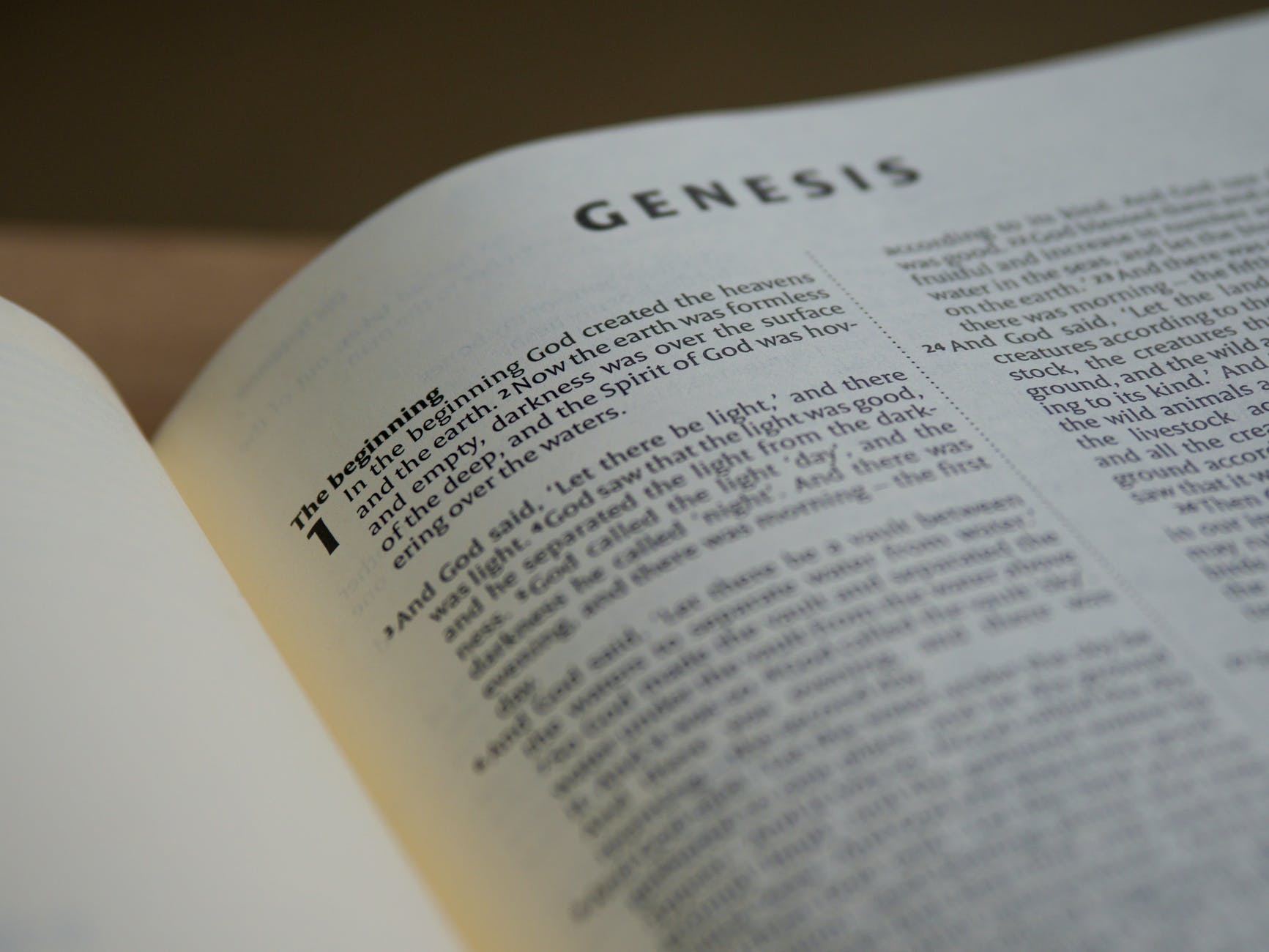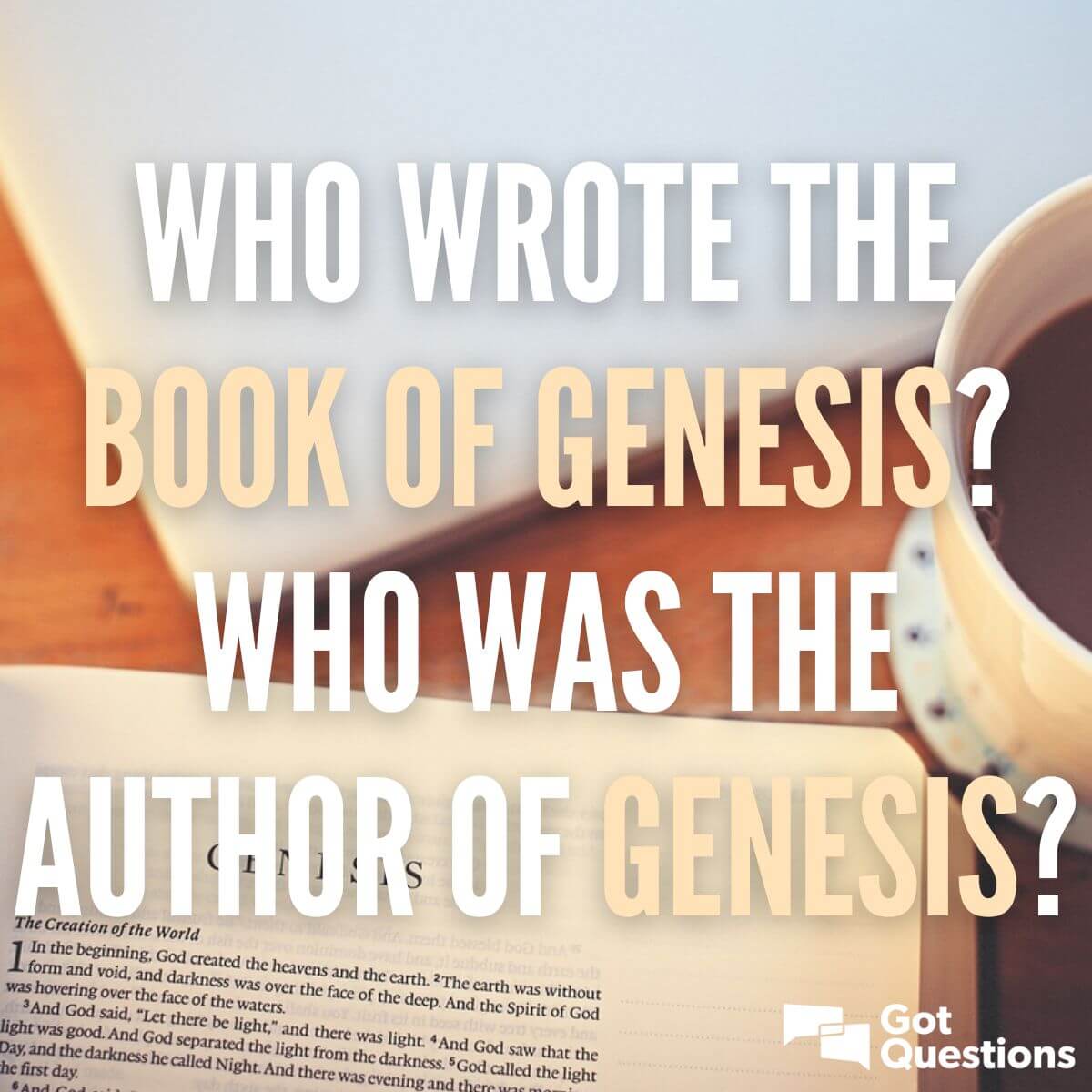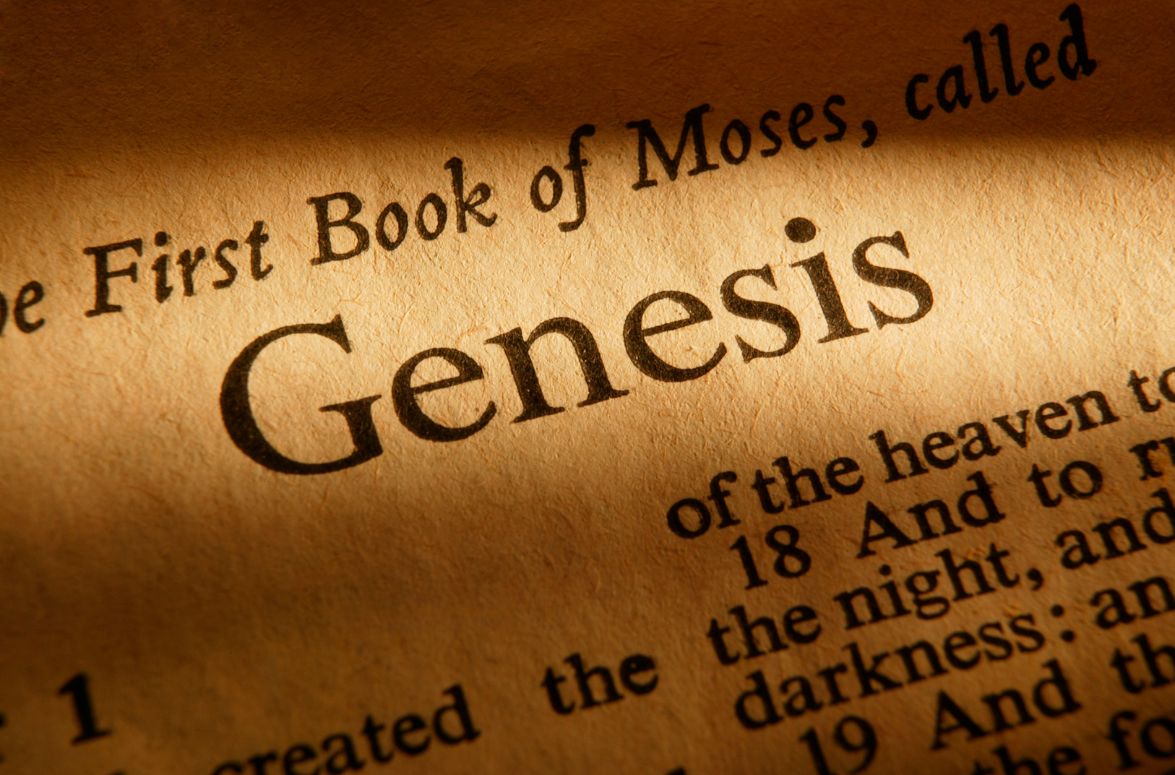The question of who wrote the book of Genesis has captivated curious minds for centuries, you know. It's a really big deal for anyone wanting to understand the very first pages of the Bible, and it opens up some truly interesting discussions about ancient history and how sacred texts came to be. This foundational book, which tells stories of the world's beginnings and the early days of a people, holds a special place in many traditions.
For a very long time, traditional thought has pointed to one figure as the author of not just Genesis, but the entire Pentateuch. This collection includes Exodus, Leviticus, Numbers, and Deuteronomy, too. It's a belief that has been passed down through generations, shaping how many people approach these important writings, as a matter of fact.
Yet, as scholarship has grown, other ideas have come into play. There are different ways of looking at how Genesis might have been put together, suggesting perhaps more than one hand or voice was involved. So, while one strong tradition exists, there are other views that offer a broader picture of this ancient text's creation, honestly.
- Mayhem Album Cover 1991
- Neck Tattoo Designs
- Stardew Valley Deluxe Shed Keg Layout
- Turtle Car Drawing
- 441 Angel Number
Table of Contents
- The Enduring Question: Who Wrote the Book of Genesis?
- The Traditional View: Moses as the Author
- Exploring Earlier Materials and Compilation
- Modern Scholarship: Different Sources and Theories
- What Does "Genesis" Really Mean?
- Frequently Asked Questions About Genesis Authorship
The Enduring Question: Who Wrote the Book of Genesis?
The book of Genesis stands as the very first book in both the Hebrew Bible and the Christian Bible, you know. It lays the groundwork for so much that comes after it, providing accounts of how the world began and how a particular people came into being. For many, its opening words carry immense weight and meaning, really.
Asking about its author is not just an academic exercise. It touches upon how we understand the authority and origin of these ancient writings. It's a question that has been discussed and debated for a very long time, and continues to be today, in a way.
The word 'genesis' itself offers a clue to the book's content. It means 'beginning' or 'origin,' which is pretty straightforward. So, the book of Genesis contains the Hebrew traditions about the origins of the world and, too, of their people, setting the stage for their national story.
- Thicc Fnaf Characters Girl
- Vogue 1037 American Designer Bill Blass Sewing Pattern
- Asian Babes
- Valentines Day Quotes For Friends
- Working For The Joker Gotham Meme
The Traditional View: Moses as the Author
For a very long time, the common belief has been that Moses wrote the Pentateuch. This includes the book of Genesis, Exodus, Leviticus, Numbers, and Deuteronomy. This idea is a strong one, deeply rooted in many religious traditions, and it's something people have held onto for centuries, you know.
This tradition suggests that Moses, a central figure in the history of the Hebrew people, put these books together. It implies a single, divinely inspired author for these foundational texts. So, it's a view that gives a lot of weight to Moses' role in shaping these early sacred writings, basically.
Evidence Supporting Moses' Authorship
Arguments for Moses' authorship are quite extensive. One significant point comes from the New Testament itself. The Lord Jesus himself, and the Gospel writers, made statements that support Moses' connection to the law, in fact. For example, in Mark 10:3 and John 1:17, it is said that the law was given by Moses, you see.
This uniform tradition, spanning centuries, reinforces the idea. It suggests a consistent belief within both Jewish and Christian communities about who penned these early books. So, this historical consensus offers a strong foundation for the traditional view of Moses as the author, too.
The Lord Jesus and the Law
When the Lord Jesus spoke of the law, he often linked it directly to Moses. This connection is seen as a powerful endorsement of Moses' role in receiving and transmitting these divine instructions. It suggests that Jesus himself acknowledged Moses as the figure through whom these foundational rules came, you know.
The Gospel writers, in their accounts, also reinforce this idea. They present Moses as the one who delivered the law, which includes the principles and stories found within the Pentateuch. This consistent portrayal adds weight to the traditional belief that Moses was indeed the author of these very important texts, honestly.
The Pentateuch and its Scope
The Pentateuch, as a collection, covers a vast sweep of history and law. Genesis begins with creation and ends with the Israelites in Egypt. The subsequent books, Exodus through Deuteronomy, detail their liberation, the giving of the law at Sinai, their wilderness wanderings, and preparations to enter the promised land, more or less.
Traditional thought holds that Moses wrote all five of these books. This means he would have been the scribe for a truly significant portion of the Hebrew Bible. It is believed that he could have read these texts himself, having been their originator, which is a rather interesting thought.
The entire Pentateuch is a foundational block for understanding Jewish and Christian faith. Its stories, laws, and narratives establish core beliefs and practices. So, the question of who wrote it, particularly Genesis, remains a central point of discussion for many, as a matter of fact.
Exploring Earlier Materials and Compilation
While tradition points to Moses as the author, some perspectives suggest a slightly different role for him. It is likely that Moses compiled and edited earlier materials. This means he might not have started from scratch, but rather brought together existing traditions, stories, and records, you know.
This idea suggests a process of gathering and arranging, rather than solely originating every single word. It allows for the possibility that some of the narratives in Genesis existed in various forms before Moses put them into the structured book we have today. So, his role could have been that of a masterful editor, in a way.
Moses as Compiler and Editor
The idea of Moses as a compiler and editor is quite compelling for some. It means he took older accounts, perhaps oral traditions or written fragments, and wove them into a cohesive narrative. This would have required a deep understanding of his people's history and their relationship with the divine, you see.
This perspective also helps to explain certain features within Genesis, such as potential repetitions or shifts in style. A skilled editor could have integrated different accounts while preserving their original flavor. So, Moses' contribution would still be immense, shaping these diverse elements into a single, powerful book, honestly.
The Book of Jasher: A Related Account
There is a mention of another ancient text, the Book of Jasher. This book is described as nearly an exact account of what Moses wrote in Genesis, but with more details. This suggests that there might have been parallel narratives or sources that existed in the ancient world, you know.
The existence of such a book, even if its full text is not widely available today, hints at a broader literary landscape in ancient times. It raises questions about the common sources or shared traditions that might have informed both Genesis and the Book of Jasher. So, it's a fascinating piece of information that adds another layer to the discussion of Genesis's origins, you see.
The author of the Book of Jasher and the time period of its original writing are subjects of their own discussion. But its connection to Genesis is something worth noting when considering the background of the first book of the Bible, too.
Modern Scholarship: Different Sources and Theories
Modern scholars often look at the book of Genesis through a different lens, you know. They propose that the first five books of the Bible, including Genesis, were not written by a single author. Instead, they suggest that multiple sources contributed to the text over time, in a way.
These sources are believed to have been anonymous originally. Modern scholars have given them specific names to help with discussion and study. This approach, often called the Documentary Hypothesis, offers a different way of understanding the structure and variations within Genesis, you see.
The Yahwist and Priestly Sources
One of the most discussed aspects of this scholarly view involves what are called the Yahwist and Priestly sources. It is believed that these were two different traditions or groups that each wrote their own stories. These distinct voices can be identified by their particular vocabulary, theological focus, and narrative style, more or less.
For example, the Yahwist source is often characterized by its use of "Yahweh" as the divine name and its vivid, anthropomorphic descriptions of God. The Priestly source, on the other hand, tends to focus on priestly matters, genealogies, and a more formal style. So, recognizing these different patterns helps scholars trace the various threads woven into Genesis, basically.
Addressing the "Two Creation Stories" Question
The idea of multiple sources helps to answer a common question: why are there two creation stories in Genesis? If Moses wrote the entire book, why would he include two accounts, and why would their chronology of creation be different? This is a point that has puzzled many readers, you know.
The scholarly answer is that these two accounts come from different sources. One story is attributed to the Yahwist source, and the other to the Priestly source. Each source had its own way of telling the story of creation, reflecting its particular theological emphasis and understanding. So, their inclusion side-by-side is seen as evidence of compilation from various traditions, you see.
This approach helps to reconcile what might appear as inconsistencies within the text. It suggests that the final editor, whoever that may have been, chose to include both versions rather than picking just one or trying to blend them perfectly. It's a rather interesting way to look at the text's formation, honestly.
Anonymous Sources and Modern Naming
The five different sources believed to have written the first five books of the Bible were all anonymous. They did not sign their names to their writings. Modern scholars, in order to facilitate discussion and analysis, have given them source names. These names, like Yahwist (J), Elohist (E), Deuteronomist (D), and Priestly (P), are tools for academic study, you know.
These names help researchers talk about specific sections of the text and the characteristics they exhibit. It is a way of organizing and making sense of the layers of writing that appear to be present in Genesis and the other books of the Pentateuch. So, while the original authors remain unknown, these scholarly designations provide a framework for understanding the book's origins, too.
What Does "Genesis" Really Mean?
The word 'Genesis' itself is a Greek word, meaning 'beginning' or 'origin.' This title perfectly captures the essence of the book's content. It is a book about how things started: the world, humanity, sin, and the early history of the Hebrew people, you know.
So, the book of Genesis contains the Hebrew traditions about the origins of the world and of their people. It sets the stage for the entire narrative of the Bible, introducing key figures, covenants, and themes that will develop throughout subsequent books. It's a foundational text, really, that lays out the very first steps of a grand story.
It's important to remember that this book, which has about 38,000 words depending on the version, is a religious text. It is not a scientific treatise, but rather a theological and historical account from a particular cultural perspective. Its purpose is to convey profound truths about creation, humanity, and God's relationship with the world, you see. For more on ancient texts, you might find this information on ancient literature helpful.
By the way, there is also a prog rock band called Genesis, which is quite different from the book. Just a little fun fact to keep things clear, you know.
Frequently Asked Questions About Genesis Authorship
Did Moses really write Genesis?
Traditionalists hold a strong belief that Moses wrote the Pentateuch, which includes the book of Genesis. This view has been passed down for many generations, you know. Arguments for this include references from the Lord Jesus himself and the Gospel writers, who spoke of the law being given by Moses.
However, modern scholars often propose that Moses likely compiled and edited earlier materials. They suggest that Genesis, along with the other first five books of the Bible, came from various anonymous sources over time. So, while Moses is central to the traditional view, there are other ideas about his exact role in the writing process, in a way.
Why are there two creation stories in Genesis?
The presence of two creation stories in Genesis is a key point of discussion for many. If Moses wrote the book, some ask why there would be two accounts with different chronologies. This is a very common question, you know.
Modern scholarship offers an explanation for this. It suggests that these two stories come from different sources, specifically the Yahwist and Priestly sources. Each of these sources is believed to have written its own version of the creation narrative. The final form of Genesis then combined these two accounts, rather than choosing just one. Learn more about biblical origins on our site, as a matter of fact.
What exactly is the Pentateuch?
The Pentateuch refers to the first five books of the Hebrew Bible and the Christian Old Testament. These books are Genesis, Exodus, Leviticus, Numbers, and Deuteronomy. The word "Pentateuch" itself comes from Greek, meaning "five books" or "five scrolls," you know.
This collection is foundational to both Jewish and Christian faiths. It tells the story of creation, the early history of humanity, the call of Abraham, the exodus from Egypt, the giving of the law at Mount Sinai, and the journey of the Israelites towards the promised land. Tradition says that the Pentateuch was written by Moses, and therefore could have been read by him, too. You can link to this page for more insights into ancient scriptures.
- We Had A Splashing Great Year Gift Tag
- Jakara Mitchel
- Wood Pegboard With Baskets
- Womens Bohemian Belts For Dresses
- Tattoos With Skulls And Flowers


